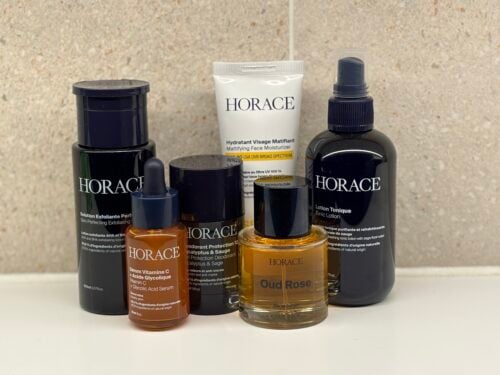Horace Skincare Review: Why Horace Is Dominating The Modern Man’s Bathroom Cabinet
Feb 21, 2026Why I Care About Men’s Health… And Why You Should Too – Talking About Men’s Health
- Jul 16, 2025
- 0 Comments
697

And Why You Should Too
Blog Contributor: Shelby Leventhal
Why I’m Talking About Men’s Health
I may not be a man, but as a college woman surrounded by male friends who treat their health like it’s optional, I’ve learned this: most of them won’t take it seriously until someone else does.
So here I am—talking about men’s health, because too many of you aren’t.
My Background and Personal Connection
Hello, my name is Shelby Leventhal, a rising senior at the University of Kentucky pursuing a degree in Communications and Journalism. At an early stage in life, I became interested in physical and mental health, I attribute this to the four sports I participated in growing up and the mental health challenges I have endured along the way. However, there is one factor that has been consistent in these instances, the multitude of resources women have for the challenges they encounter.
Stereotypes That Shape Our Health Expectations
Writing this blog as a young woman is my way of joining a bigger conversation. Prior to this, I began to ponder about the fundamental differences women and men face in health. For generations men are to be portrayed in society as robust and competitive serving as protectors and providers for women and children. How are women portrayed? Delicate, submissive, and supportive serving as caregivers.
Why do we tend to associate these characteristics with men or women without question? Is it media portrayal? How about long-standing stereotypes? Or maybe even the workplace?
These and many others are the true reasons, I hope to challenge these stereotypes even just a little.
Where’s the Encouragement for Men?
Has anyone else noticed how within these stereotypes, women are the ones encouraged to take care of themselves whether it be physically or mentally? Get your check up, pursue therapy, advocate for your self-worth and love. How often do we hear men being encouraged to do the same? Commonly, not until it’s too late.
Let’s change this.
The Cancers We Don’t Talk About Enough
Cancer: a relentless invader, silent killer, and life-shattering diagnosis. Pause here and think, how many types of cancer are you familiar with and what do you know about them? Speaking for myself, the first to come to mind are breast, skin, and lung. While thinking about this, I caught myself solely contributing these cancers to women.
Now I ask, what do you know about prostate or testicular cancer?
Why Women Should Speak Up, Too
Prior to this opportunity [to intern with Men’s Health Network] I knew very little, though this sounds ignorant I did catch myself thinking, “why should I care? That’s for men.” That right there is why women should care about these types of cancers. Don’t we all have at least one man in our life that we value? Maybe it’s a father, maybe an uncle, a husband, or even just a friend. Why should we as women not advocate for men to care for themselves the way women are advocated for?
Breaking the Stigma Around Men’s Health
Gender, age, or lack of knowledge should not be an excuse to neglect men’s health. Just because men portray themselves as strong and secure, that is not necessarily accurate. Men’s physical and mental health is often overlooked and unprioritized because of the stigma we discussed earlier. Let’s begin to treat men with the same healthy initiates that women receive. I want to share some of the ways we as women can stand with the men in our lives.
What Support Really Looks Like
An effortless first step we as women can stand with the men in our lives is to simply check in. I am not referring to a half-hazard “how are you?” where we ask to just sound polite. No, I am talking about being intentional, “just checking in—how’s your head and heart these days?” Even if it is healthy as one can be, it makes a true difference.
I haven’t overlooked physical health either. Just because a man is active and eats well doesn’t mean there aren’t silent threats to his health. Something as simple as, “you’ve been on my mind. Are you taking care of yourself and feeling alright health-wise?” can make a true difference when it comes to health initiatives.
Leading by Example in My Own Life
My dad [Mike Leventhal, Executive Director at Men’s Health Network] has always emphasized the importance of men going to the doctor and getting regular checkups. Taking these small initiatives can truly save a life and ensure men are leading their healthiest lives. Men’s Health Network stresses the importance of this and regularly hosts and participates in events to support this cause. Recently, my dad and I attended a health event in Memphis, Tennessee where men had the opportunity for a free PSA (prostate specific antigen) blood test. I quickly learned that if men are presented with an opportunity like a free health screening, they will utilize it because they care about their health just as much as women do.
The Culture of Health Neglect in College Men
Sure, all these initiatives are reliable ways to check in on the men in our lives, but how can we normalize these? Being a young woman at a large university, I have observed the young men around me. These young men are encouraged to ignore their health and have a “live in the moment” mentality. They engage in heavy episodic drinking, vaping, and even tobacco use.
This raises concern because these young men’s brains have not fully developed and are potentially setting themselves up for failure in the future. Personally, I feel like this is one of the many reasons that men may encounter health concerns in the future. I view these choices as having a chain effect.
From Habits to Harm: Understanding the Risks
Take excessive alcohol consumption. Sure, it starts as a fun way to hang out and be social with friends. However, if these excessive behaviors become normalized, the body and mind begin to rely on the alcohol for physical dependence, a mental crutch, and daily function. This in turn lead to alcoholism which leads to liver cancer.
Let’s have another example, tobacco and nicotine use which starts as a casual habit; however, I have noticed that because the behavior is so normalized many men do not tend to quit after college. Nicotine and tobacco both act as a psychoactive substance releasing dopamine and feelings of relaxation. However, these temporary feelings will surely not be worth it when diagnosed with lung cancer.
Showing Up Means Speaking Up
As a woman, I believe in taking care of one’s health is not just about avoiding illness but rather showing up for yourself and the ones that care about you.
Men should not be afraid to schedule that checkup or have honest conversations about mental health, one small daily habit changes a life.
Being healthy is not just about living longer, but living better.
About the Author:
Shelby Leventhal is a rising senior at the University of Kentucky, pursuing a degree in Communications and Journalism. A dedicated member of Delta Zeta sorority, Shelby is known for her vibrant personality, leadership, and commitment to fostering a sense of community.
Outside of academics, Shelby enjoys a variety of hobbies that reflect her dynamic interests. She’s an enthusiastic participant in recreational sports, a lover of music, an adventurous cook, and a devoted friend to all things furry. Whether she’s cheering on her Wildcats or spending time with her sorority sisters, Shelby brings creativity and energy to everything she does.
Shelby is passionate about using her social media expertise to inspire and connect with others, always striving to leave a positive impact wherever she goes.
Publisher: Source link







